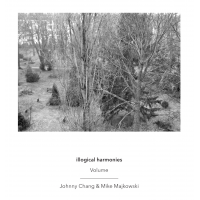Home » Jazz Articles » Multiple Reviews » Another Timbre’s Violin +1 Series
Another Timbre’s Violin +1 Series
 Bryn Harrison
Bryn Harrison Receiving the Approaching Memory
Another Timbre
2016
Bryn Harrison's previous album release on Another Timbre, Vessels (2013), focused on the composer's use of repetition, as does Receiving the Approaching Memory. Referring to this and similar pieces, Harrison has written that they explore high levels of repetition that draw on the pretext that exact repetition changes nothing in the object itself but does change something in the mind that contemplates it; these works deal explicitly with aspects of duration and memory through which near and exact repetition operate in close proximity throughout and provide points of orientation and disorientation for the listener.
A major difference between Vessels and Receiving the Approaching Memory is that the former was performed solely by Philip Thomas at the piano, while the latter is a duo of Aisha Orazbayeva on violin and Mark Knoop on piano. Whereas Vessels demanded the listener to have powers of concentration as great as those that Thomas required to record it, Receiving the Approaching Memory is nowhere near so demanding of the listener. Firstly, its thirty-nine minutes are broken up into five tracks varying in length from five-and-a-half minutes to almost ten minutes, in contrast to the unbroken hour-and-a quarter of Vessels. Just as importantly, the addition of violin to the piano, with the two playing separate lines, gives the listener a second focus, with the two instruments interweaving and occasionally creating the impression of a dialogue. Orazbayeva and Knoop both give faultless performances that animate the music.
The piece's inbuilt repetition does require full-on concentration of the listener if it is not to become "just there." But when it is afforded that concentration, the effect of the music is fascinating—echoing Harrison's words that it "does change something in the mind that contemplates it." The two Harrison releases should be considered as companion pieces, with the violin just making Receiving the Approaching Memory the more appealing of them.
 Linda Catlin Smith
Linda Catlin Smith Dirt Road
Another Timbre
2016
Dirt Road (2006) is an hour-long work in fifteen movements for violin and percussion by Canadian composer Linda Catlin Smith (who is new to Another Timbre, unlike the others in this batch). It can be performed in its entirety or in any number of movements, in any order. Smith says she chose to compose for this combination of instruments as she thought it was one of the most difficult she could imagine and to give herself a difficult challenge. She imagined the two instruments as travellers, moving along a simple landscape, with all of its slight or grand changes.
Without wishing to doubt the difficulty of the combination of violin and percussion for the composer, in the hands of Mira Benjamin and Simon Limbrick, respectively, the instruments create rich, satisfying sounds, with Limbrick employing an impressive range of instruments and effects to complement the violin's own breadth of tones and techniques. The two fit together well, sounding made for each other and creating a warm, human-sounding soundscape that is in keeping with the experiences of Smith's imagined travellers.
The fifteen short discrete movements—ranging from two-and-a-half minutes to almost ten—are very effective; with some being a focus for Benjamin, some for Limbrick and some for both together, overall the piece is varied and fresh. While the movements can be played in any order, on CD they can also be played in any order and sound just as effective—that is well over a trillion possible playing orders, or different journeys through that landscape. All of them are unreservedly recommended. The good news is that Another Timbre is already planning another release featuring Linda Catlin Smith compositions.
 Illogical Harmonies
Illogical Harmonies Volume
Another Timbre
2016
Illogical Harmonies is the name of the Berlin-based duo of violinist Johnny Chang and Australian double bassist Mike Majkowski. The pair have previously released Illogical Harmonies with d'incise (INSUB, 2016), and are both members of the larger ensemble Konzert Minimal which focuses on the music of the Wandelweiser group, of which Chang himself is a member. Of the four discs here, Volume is the only one featuring two stringed instruments. Consequently, it has a sound all of its own, something which Chang and Majkowski fully exploit. Across five joint compositions, varying in length from four-and-a-half minutes to over twenty-two minutes, the two of them play continuously, often both sustaining long notes to create a pleasing drone.
Majkowski's website says "the music of this duo highlights string resonance and illogical harmonies" without further elaborating the meaning of the phrase that the duo employs as its name. That phrase feels like an oxymoron as "illogical" implies "disharmony" while "harmony" implies "logic." The music here does not reveal any harmonies that seem illogical; on the contrary, although some may be uncommon harmonies there seems to be nothing wrong with their logic. Aside from such pedantry, without exception this combination of violin and bass is extremely relaxing and stimulating, owing its success equally to both instruments and being an excellent advertisement for both. Music to return to frequently.
 Angharad Davies / Tisha Mukarji
Angharad Davies / Tisha Mukarji Ffansïon / Fancies
Another Timbre
2016
It is fitting that the duo of violinist Angharad Davies and inside pianist Tisha Mukarji is included in this series. While this album bears catalogue number at99, the duo's previous release on the label was the excellent Endspace (2007), bearing number at5, in the infancy of Another Timbre. Since then they have been stalwarts of the label, appearing together in a trio with zither player Dimitra Lazaridou-Chatzigoga on Outwash (2012) and separately on many more Another Timbre releases. So it is a pleasure to welcome another duo album by the pair, Ffansïon / Fancies, its bilingual Welsh-English title acknowledging Davies's Welsh roots.
Recorded in January 2016, the album consists of seven tracks, five entitled "Ffansïon / Fancies i—v" and the other two "For Lucio i & ii." The Another Timbre website describes this as "a disc of improvisations and composed pieces" but the actual music effectively blurs the boundaries to the extent that it is impossible to tell composition from improvisation. Comparisons between similarly titled pieces do not provide any definite answers. No matter. Davies and Mukarji are both such confident, sure-footed improvisers, and so secure in each other's company, that their music could be entirely improvised, entirely annotated, or anywhere on the spectrum in between.
Aside from that, the salient qualities of their music are the distinctive ways they each play their instruments, the understanding and empathy they display, and the logic and economy of their music, which carries the listener along with them. This album is as good as anything the two have done together or separately. An album to return to time after time, year after year.
Tracks and Personnel
Receiving the Approaching Memory
Tracks: Receiving the Approaching Memory i; Receiving the Approaching Memory ii; Receiving the Approaching Memory iii; Receiving the Approaching Memory iv; Receiving the Approaching Memory v.
Personnel: Aisha Orazbayeva: violin; Mark Knoop: piano.
Dirt Road
Tracks: 3:29; 6:59; 4:58; 3:19; 3:04; 3:20; 6:02; 4:56; 4:31; 5:36; 2:27; 4:22; 2:15; 9:38; 2:27.
Personnel: Mira Benjamin: violin; Simon Limbrick: percussion.
Volume
Tracks: I; II; III; IV; V.
Personnel: Johnny Chang: violin; Mike Majkowski: double bass.
Ffansïon / Fancies
Tracks: Ffansïon / Fancies i; For Lucio i; Ffansïon / Fancies ii; Ffansïon / Fancies iii; Ffansïon / Fancies iv; For Lucio ii; Ffansïon / Fancies v;
Personnel: Angharad Davies: violin; Tisha Mukarji: inside piano.
Tags
Angharad Davies
Multiple Reviews
John Eyles
Another Timbre
Mike Majkowski
Dimitra Lazaridou-Chatzigoga
PREVIOUS / NEXT
Support All About Jazz
 All About Jazz has been a pillar of jazz since 1995, championing it as an art form and, more importantly, supporting the musicians who make it. Our enduring commitment has made "AAJ" one of the most culturally important websites of its kind, read by hundreds of thousands of fans, musicians and industry figures every month.
All About Jazz has been a pillar of jazz since 1995, championing it as an art form and, more importantly, supporting the musicians who make it. Our enduring commitment has made "AAJ" one of the most culturally important websites of its kind, read by hundreds of thousands of fans, musicians and industry figures every month.



















